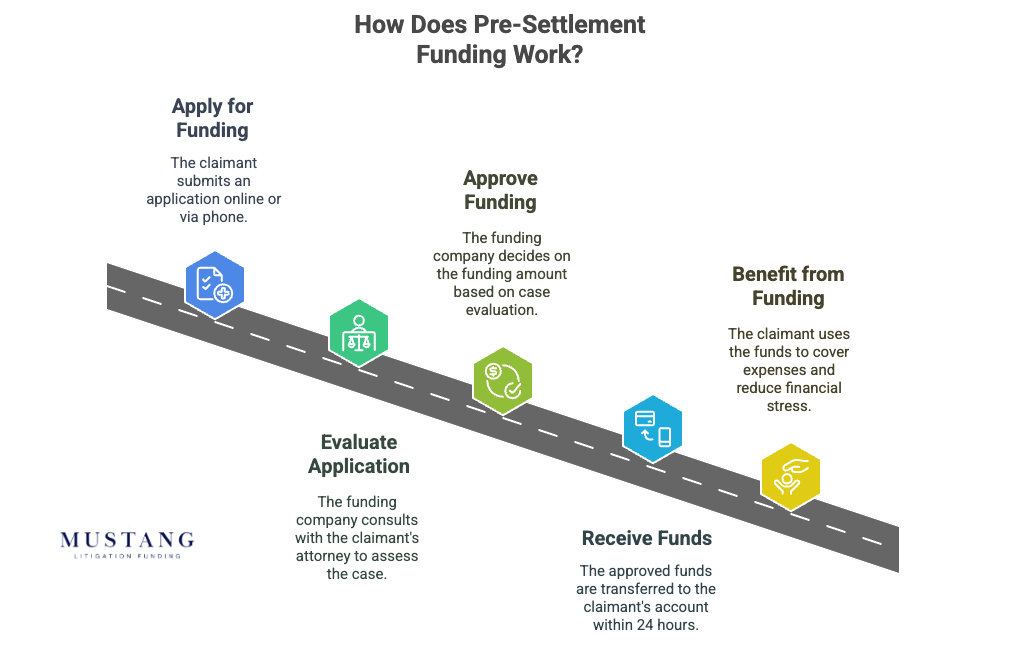While you expect that your personal injury lawsuit will eventually yield a good settlement, the process can take months or more. If you are heading to trial, it can take years before you receive funding. Meanwhile, while recuperating from your injuries you still have bills to pay.
Colorado pre-settlement funding provides cash while you wait for the insurance company to come up with a reasonable settlement.
While pre-settlement funding is often referred to as a lawsuit loan, that is not accurate. This funding is actually a disbursement in anticipation of a later settlement and works much like a cash advance.
Since 2018, Mustang Funding has provided more than $50 million in funds to plaintiffs and attorneys.
Is Pre-Settlement Funding Considered a Loan?
No, pre-settlement funding is not a loan. While we occasionally use the term “lawsuit loan”—since it’s a common search phrase—what we offer is technically different.
Pre-settlement funding is a non-recourse cash advance provided in exchange for a portion of your potential future settlement. Unlike a traditional loan, you are not required to repay the advance if you lose your case. In essence, we assume the risk. You receive funds upfront, and if your case is successful, we collect an agreed-upon share of your settlement.
How Pre-Settlement Funding in Colorado Works

If you have a pending personal injury lawsuit and your case meets the minimum threshold for a pre-settlement loan in Colorado, you may apply for funding. You must be working with a lawyer who agrees to work with the lender and can prove your case is strong.
The lender thoroughly reviews the details of your case before making a decision regarding pre-settlement funding.
Pre-settlement funding does not require a credit check. You are free to use the money in any way you see fit, without restrictions.
Pre-settlement funding is non-recourse. That means that if you do not receive a settlement or the verdict in a trial is unfavorable, you do not have to repay the money. The lender assumes all of the risk.
After receiving your settlement or award, you repay your pre-settlement funding.
Colorado Pre-Settlement Funding Laws
Under Colorado law there is a $75,000 minimum on all pre-settlement advances. Anything below that amount is subject to interest rate caps.
If your case does not qualify for the $75,000 minimum, you are not eligible for pre-settlement funding in Colorado. There are other options, such as traditional bank loans or local emergency assistance funding.
Personal Injury Pre-Settlement Funding in Colorado
Statute of Limitations
In Colorado, the statute of limitations for filing a personal injury lawsuit is generally two years from the date of the accident. However, if the claim involves any type of motor vehicle, the statute of limitations is three years from the accident date.
Failing to file a personal injury lawsuit within the allotted time period means your case cannot go forward.
Modified Comparative Negligence
For liability purposes, Colorado operates under a modified comparative negligence standard. As long as the plaintiff is not as negligent as the defendant from whom they are seeking damages, they may receive compensation. Any compensation is reduced by the percentage of fault held by the plaintiff, as determined by a judge or jury. For instance, if you are held 25 percent responsible for the accident, a $100,000 award is reduced to $75,000.
Contact Us
For more information about pre-settlement funding in Colorado and whether you qualify, schedule a free consultation with Mustang Funding today. We serve Denver, Colorado Springs, Aurora, Fort Collins, Pueblo, and other areas of the state.

